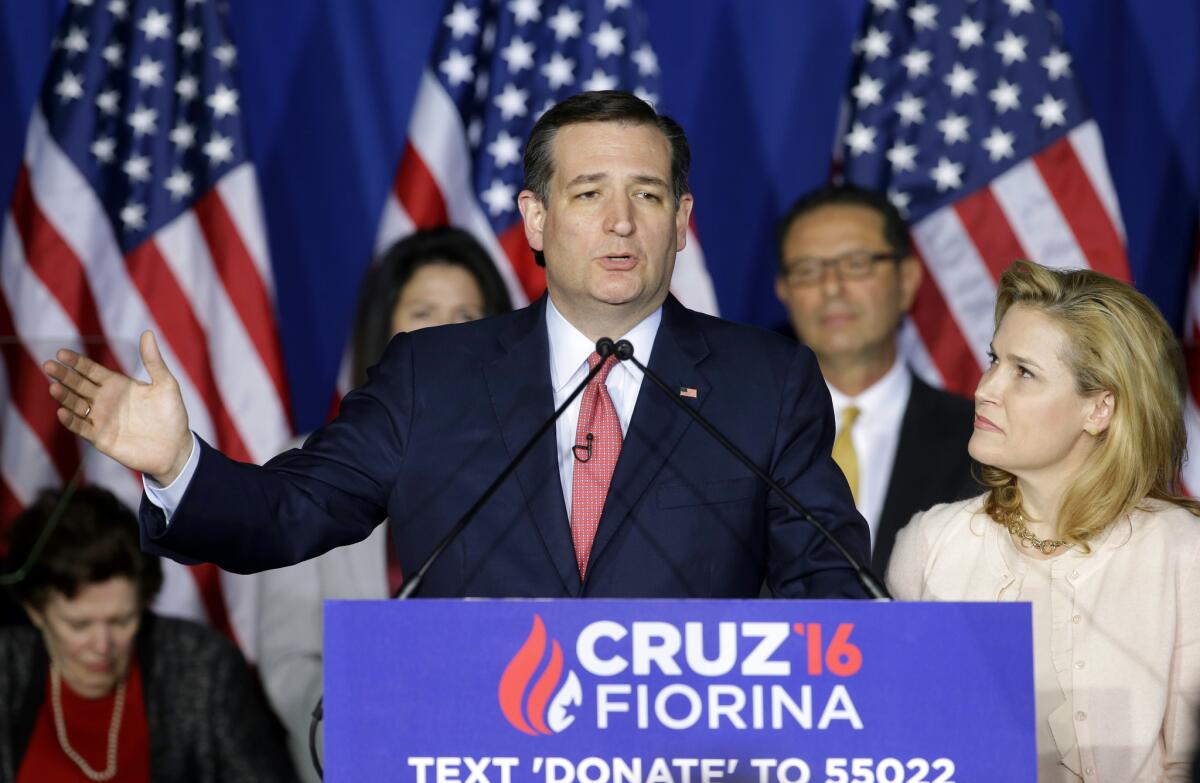Ted Cruz was right: GOP voters wanted an anti-establishment candidate, just not him

Ted Cruz, with wife Heidi at his side, ends his campaign for president.
Reporting from Washington — Ted Cruz was never expected to advance this far in the Republican presidential nominating contest.
The Texas senator was seen as too extreme for most Republicans, too despised by the establishment, too unknown by the rest of the country.
It turned out Cruz was right all along about what Republican voters really wanted in 2016: an anti-establishment rabble-rouser who would not apologize.
He was just wrong about the outsider.
Election 2016 | Live coverage on Trail Guide | Indiana primary election results | Track the delegate race | Sign up for the newsletter
On Tuesday, overshadowed like the other presidential aspirants by Donald Trump, Cruz suspended his campaign, saying he no longer saw a viable path forward.
“Together, we left it all on the field in Indiana. We gave it everything we’ve got, but the voters chose another path,” Cruz said in Indianapolis, his family by his side, as supporters shouted “no” at the news. “And so, with a heavy heart, but with boundless optimism for the long-term future of our nation, we are suspending our campaign.”
Cruz declined to congratulate Trump, whose path to the nomination was essentially cleared by the exit, though the businessman later praised his onetime rival as a “hell of a competitor.”
“He is a smart, tough guy,” Trump said at his own election night celebration at Trump Tower in New York. “And he has got an amazing future.”
The defeat was one of contrast: While Trump’s bombastic style and controversial ideas only enhanced his support, Cruz’s preacher-like delivery often rubbed voters the wrong way.
He outlasted establishment favorites like Sen. Marco Rubio and former Florida Gov. Jeb Bush, just as he predicted he would. Yet with his intense unpopularity among GOP leaders, Cruz could not rally the party behind him, even as part of a last-ditch effort to block Trump.
Cruz’s candidacy in this unusual election year showed the staying power still possible with a strong grass-roots organization, but also the limits of an old-school campaign based on conservative economic and social issues as the Republican Party struggles to attract a broader swath of voters.
For weeks, Cruz’s only hope had been to stop Trump from securing the 1,237 delegates needed to win the nomination outright. He spent considerable time and money preparing for a floor fight among delegates at the Republican National Convention in Cleveland in July.
But after losses mounted, most recently in Indiana, that route closed. Even a last-minute alliance with rival John Kasich to divvy up remaining states backfired with voters.
By suspending his campaign, Cruz continues to control many of his delegates, making him a potential power broker at this summer’s convention if Trump fails to reach 1,237.
“Ted Cruz ran the absolute best campaign he could run,” said Josh Holmes, a GOP strategist, but still could not provide voters a viable alternative to Trump.
Cruz was the first Republican candidate to launch his campaign, appearing in March 2015 before students at the Liberty University, an evangelical college in Virginia. He lambasted the “Washington cartel” and made sure no other candidate could get to his right as Rubio and Bush focused on winning over the establishment.
Trump’s steady rise brought discomfort to the other candidates, but not to Cruz initially. He drew the businessman closer, calling him “terrific.” Rather than battle Trump, Cruz treated him as a friendly rival. The hope was Cruz would scoop up Trump supporters once the businessman’s campaign came to an end.
The strategy brought early success as Cruz easily secured backing from top tea party and evangelical Christian leaders. He built an impressive grass-roots organization and crisscrossed the country under a grueling, methodical schedule. Even detractors had begrudging admiration for his campaign operation. He won the first caucuses in Iowa.
But like the other candidates who have since receded, Cruz was no match for Trump.
Once Trump began turning his sights on “Lyin’ Ted” – his preferred taunt – the senator could never quite recover. He stumbled in the conservative Southern states that should have been his to win and was wiped out by Trump in the Northeast and mid-Atlantic.
Instead, Cruz focused his attention on stopping Trump in the delegate race, an obscure aspect of the nominating process that seemed tailor-made for his army of devoted activists.
The unusual strategy showed initial promise. Cruz began building a corps of delegates in states Trump already had won, leaving the billionaire crying foul over a “rigged” system.
Trump clearly felt the heat, attacking the appearance of Cruz’s wife, Heidi, and citing an unverified report in the National Enquirer that Cruz’s father, Rafael, had known John F. Kennedy assassin Lee Harvey Oswald.
But although Cruz won some victories, both in Wisconsin’s primary and in state delegate contests, Trump’s team rebounded, slowing Cruz’s advance in delegate math while walloping him in primary voting.
Cruz’s core constituency of tea party and evangelical voters splintered and many grass-roots leaders lost interest in the first-term senator in favor of Trump.
At crucial moments, the GOP establishment only reluctantly came around to back Cruz as a last-ditch play to stop Trump. Their endorsements were usually offered late and halfheartedly.
Cruz pinned his comeback on Indiana and the pragmatic sensibilities of Hoosier State voters. But Trump’s populism had already taken hold. And Cruz’s awkwardness betrayed him again when he referred to a basketball hoop as a “ring.”
A day before Indiana voters went to the polls, Cruz declared: “I am in for the distance. As long as we have a viable path to victory, I am in to the end.”
And then he was out.
ALSO
Live coverage of the Indiana primary
Navy SEAL killed in combat in Iraq, U.S. officials say
Larry Wilmore says he didn’t actually use the N-word at correspondents’ dinner
Follow on Twitter @LisaMascaro
UPDATES:
7:31 p.m.: The story was updated with comments from Donald Trump.
The story was originally published at 5:42 p.m.
More to Read
Get the L.A. Times Politics newsletter
Deeply reported insights into legislation, politics and policy from Sacramento, Washington and beyond. In your inbox three times per week.
You may occasionally receive promotional content from the Los Angeles Times.









